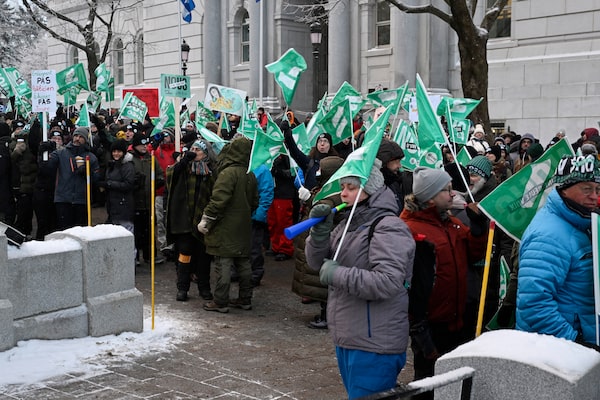
Common front union members demonstrate, blocking the entrance of the National Assembly, as the fall session comes to an end, Friday, Dec. 8, 2023, at the legislature in Quebec City.Jacques Boissinot/The Canadian Press
Parents, students and patients in Quebec are scrambling to deal with the impact of a continuing strike by hundreds of thousands of public-sector workers that has shut down schools and caused delays in health-care services.
Ashley Brus is a special-needs students educator living in Sainte-Catherine-de-Hatley, Que., and her four children – aged 7 to 10 years old – have been out of school since Friday. Ms. Brus, whose workplace is also closed because of the strike, said she offered other parents to look after their kids at her home for the coming week. She only asked them for a modest contribution to pay for lunch and snacks for the children.
“I’m taking in seven other children,” she said. “I think we all need to help each other out.”
Ms. Brus said despite the inconvenience, she fully supports the demands of her union and other striking workers. “They do need better conditions for our children to get the best education possible,” she said.
About 420,000 workers in education, health care and social services started a week-long strike Friday, demanding inflation-adjusted pay raises and better working conditions. It followed four days of job action last month, which shut down schools and delayed health-care procedures.
This “common front” of four unions known by their initials – CSQ, CSN, APTS and FTQ – declined a revised government proposal made Wednesday that provided for a 12.7-per-cent pay increase over five years, up from a previous offer of a 10.3-per-cent increase in October. They submitted a counter-offer Friday, though details have not been shared publicly and talks are continuing.
Meanwhile, some 80,000 nurses and other health care professionals represented by the Fédération interprofessionnelle de la santé du Québec (FIQ) also rejected that offer and plan to strike from Monday to Thursday.
And more than 65,000 teachers, mostly from elementary schools and high schools throughout Quebec, continued their open-ended strike that started on Nov. 23. Their union, the Fédération autonome de l’enseignement (FAE) said in a statement Wednesday that they would submit a counterproposal to the government’s offer but declined to comment further.
Sylvain Martel, a spokesperson for a parents’ advocacy group, said she is worried about the impact of the strike on student learning.
“It’s like the worst scenario coming true,” Mr. Martel said, as the planned strike means that many students will not return to school until January. “We just ruined the year for some students,” he said, noting that those who face the most difficulties at school and have the least resources at home would suffer the most.
And for parents who cannot work from home, finding someone to look after their kids becomes increasingly challenging, he said.
Mr. Martel said the situation is especially frustrating for parents, whether they support striking teachers or not, because the conflict seemed entirely predictable and, therefore, avoidable. FAE teachers, for example, have been without a contract since April 1, but have yet to reach an agreement with the government.
“It seems that we don’t realize the urgency and the impact that it can have” on students, he said.
Daniella Ghanem, from Laval, just north of Montreal, said she’ll be able to leave her 10-year-old son with his grandparents while she works. Ms. Ghanem said she supports teachers’ demands for better pay and working conditions, but worries about the effect of the strike on children.
“With the winter it’s cold outside and they tend to sit all day in front of the TV or videogames,” she said. “Children need to go back to school.”
Paul Brunet, president of the patients’ rights advocacy group Conseil pour la protection des malades, said his organization is monitoring hospitals and long-term care homes closely to make sure adequate care is maintained through the strike.
The provincial government had warned in November that hundreds of surgeries could be cancelled for each day of job action. “That’s a major impact, we’re going to have people flocking to the emergency room because we didn’t operate when we were supposed to,” Mr. Brunet said in an interview Saturday.
The continuing labour dispute puts further pressure on an already strained health care system.
“There are so many thousands and thousands of patients waiting that we have difficulty distinguishing appointments or surgeries that are postponed because of the strike or because of the lack of nursing staff,” Mr. Brunet said.
As of Tuesday, there were more than 13,500 people in Quebec who had been waiting for surgery for more than one year, according to the Ministry of Health and Social Services’ online dashboard.
A spokesperson for the McGill University Health Centre in Montreal said in a statement the strike “leads to a slowdown in certain services, including surgeries,” but could not provide numbers Saturday.
François Enault, first vice-president of the CSN, said unions understand people suffer from the strike, but that a better deal for public-sector workers means better services for all Quebeckers.
“The glaring lack of staff due to poor working conditions in the [health care] network for years also has major impacts on the quality of services,” he said.
The Ministry of Education and the Ministry of Health did not respond to The Globe’s requests for comments Saturday.